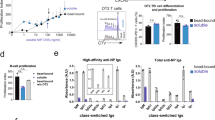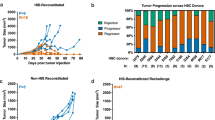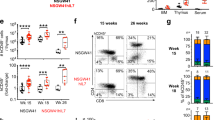Abstract
The products of the I region of the major histocompatibility complex have a role in many immunological processes and are intimately involved with, if not identical to, the genes controlling specific immune responses (Ir). Alloantibodies to I region-associated (Ia) antigens have proved extremely useful in defining the relationship between la antigens and Ir gene product function1. We have recently reported data which suggest that monoclonal anti-Ia antibodies interact with different epitopes (antigenic determinants) on macrophage Ia molecules and that distinct epitopes, though on the same Ia molecule, are recognized by T cells in association with different antigens or antigen fragments2. We have now used these monoclonal xenogeneic antibodies to guinea pig Ia antigens together with antigen-specific T-cell colonies to analyse further the role of macrophage Ia antigens in T-cell activation. We demonstrate here that the proliferative responses of individual antigen-specific T-cell colonies were often completely inhibited by only one of several anti-Ia monoclonal antibodies. These results strongly support the notion that monoclonal anti-Ia antibodies can be used to define epitopes on Ia molecules that have unique functions in the activation of antigen-specific T cells, and that individual T-cell colonies recognize antigen in association with functionally distinct epitopes on Ia molecules.
This is a preview of subscription content, access via your institution
Access options
Subscribe to this journal
Receive 51 print issues and online access
$199.00 per year
only $3.90 per issue
Buy this article
- Purchase on Springer Link
- Instant access to full article PDF
Prices may be subject to local taxes which are calculated during checkout
Similar content being viewed by others
References
Shevach, E. M. Springer Semin. Immunopath. 1, 207–234 (1978).
Burger, R. & Shevach, E. M. J. exp. Med. 152, 1011–1023 (1980).
Sredni, B., Tse, H. Y. & Schwartz, R. H. Nature 283, 581–583 (1980).
Burger, R., Clement, L., Schroer, J., Chiba, J. & Shevach, E. M. J. Immun. 126, 32–37 (1981).
Malek, T. R., Clark, R. B. & Shevach, E. M. J. Immun. 127, 616–621 (1981).
Rosenthal, A. S., Barcinski, M. A. & Blake, J. T. Nature 267, 156–158 (1977).
Benacerraf, B. J. Immun, 120, 1809–1812 (1978).
Von Boehmer, H., Haas, W. & Jerne, N. K. Proc. natn. Acad. Sci. U.S.A. 75, 2439–2442 (1978).
Schwartz, B. D., Luehrman, L. K. & Rodey, G. E. J. clin. Invest. 64, 938–947 (1979).
Author information
Authors and Affiliations
Rights and permissions
About this article
Cite this article
Clark, R., Chiba, J., Zweig, S. et al. T-cell colonies recognize antigen in association with specific epitopes on Ia molecules. Nature 295, 412–414 (1982). https://doi.org/10.1038/295412a0
Received:
Accepted:
Issue Date:
DOI: https://doi.org/10.1038/295412a0
This article is cited by
-
Binding of immunogenic peptides to Ia histocompatibility molecules
Nature (1985)
-
Macrophage signal recognition
Agents and Actions (1984)
-
Dissection of the poly(Glu60 Ala30 Tyr10) (GAT)-specific T-cell repertoire in H-2I k mice
Immunogenetics (1983)
-
MHC epitopes of Ks and Dd restrict the same population of cytolytic T lymphocytes
Immunogenetics (1983)
-
Macrophage binding of Staphylococcus albus is blocked by anti I-region alloantibody
Nature (1982)
Comments
By submitting a comment you agree to abide by our Terms and Community Guidelines. If you find something abusive or that does not comply with our terms or guidelines please flag it as inappropriate.



